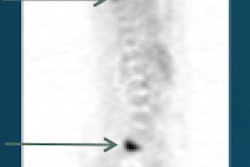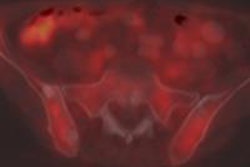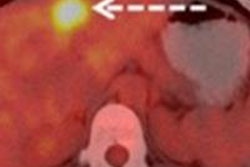FDG-PET/CT can help predict disease-free survival for patients with invasive ductal breast cancer (IDC), according to a study published in the September issue of the Journal of Nuclear Medicine.
Researchers from Kyungpook National University Hospital in Daegu, South Korea, concluded that high maximum standardized uptake values (SUVmax) of FDG in the lymph nodes prior to treatment could be an independent indicator of disease recurrence.
The study followed 65 women with IDC who had received pretreatment FDG-PET/CT and who had confirmed axillary lymph node involvement with no distant metastases. Lead author Bong-Il Song and colleagues evaluated factors including patient age, estrogen- and progesterone-receptor status, and tumor, lymph node, and metastasis (TMN) stage.
Patients then received treatment and were followed for 21 to 57 months (median, 36 months), and SUVmax values for the primary tumor and axillary lymph nodes were analyzed.
During the follow-up period, 53 patients were disease-free and 12 had disease recurrence. While both the primary tumor and nodal SUVmax values were higher in patients with recurrence, the nodal SUVmax was significantly higher.
In addition, only nodal SUVmax was found to be an independent determinant of disease-free survival. A nodal SUVmax of 2.8 was the optimal cutoff for predicting disease-free survival, according to the group.



















